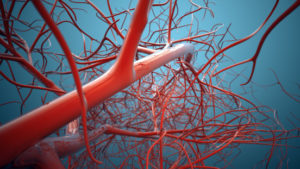Hereditary hemorrhagic telangiectasia (HHT), also known as Osler-Weber-Rendu syndrome, is an autosomal dominate disorder characterized by arteriovenous malformations. In patients with HHT, veins are more prone to rupture causing bleeding that is often treated with transfusions. Researchers hypothesized that HHT patients may have an increased risk of alloimmunization due to increased antigen presentation in the lymph nodes or other underlying genetic factors. In order to test this hypothesis, transfusion and alloimmunization records from 85 patients with HHT were retrospectively compared to 207 chronically transfused controls. Although HHT patients received significantly fewer RBC units compared to controls (4.27 vs 8.84 units, p<0.0001), patients with HHT were 6 to 7 times more likely to become alloimmunized (15.3% vs 2.4%; p<0.001); anti-E (n=9), anti-K (n=8) and anti-c (n=3) were the three most common alloantibodies identified. Further research is needed in order to confirm these findings and understand the underlying mechanism for alloimmunization in HHT patients.
Reference:

